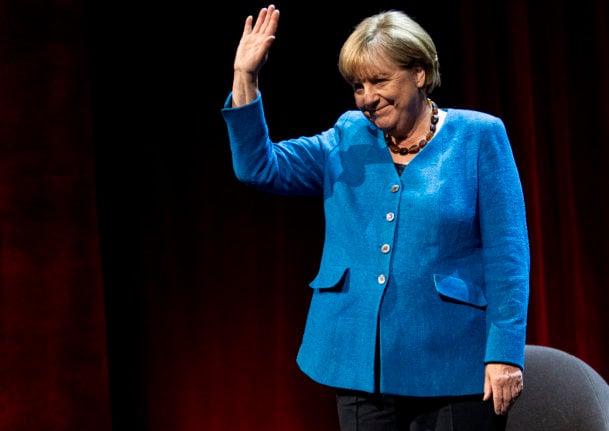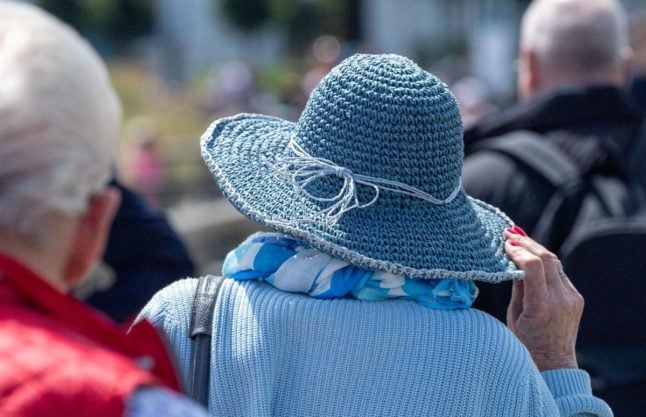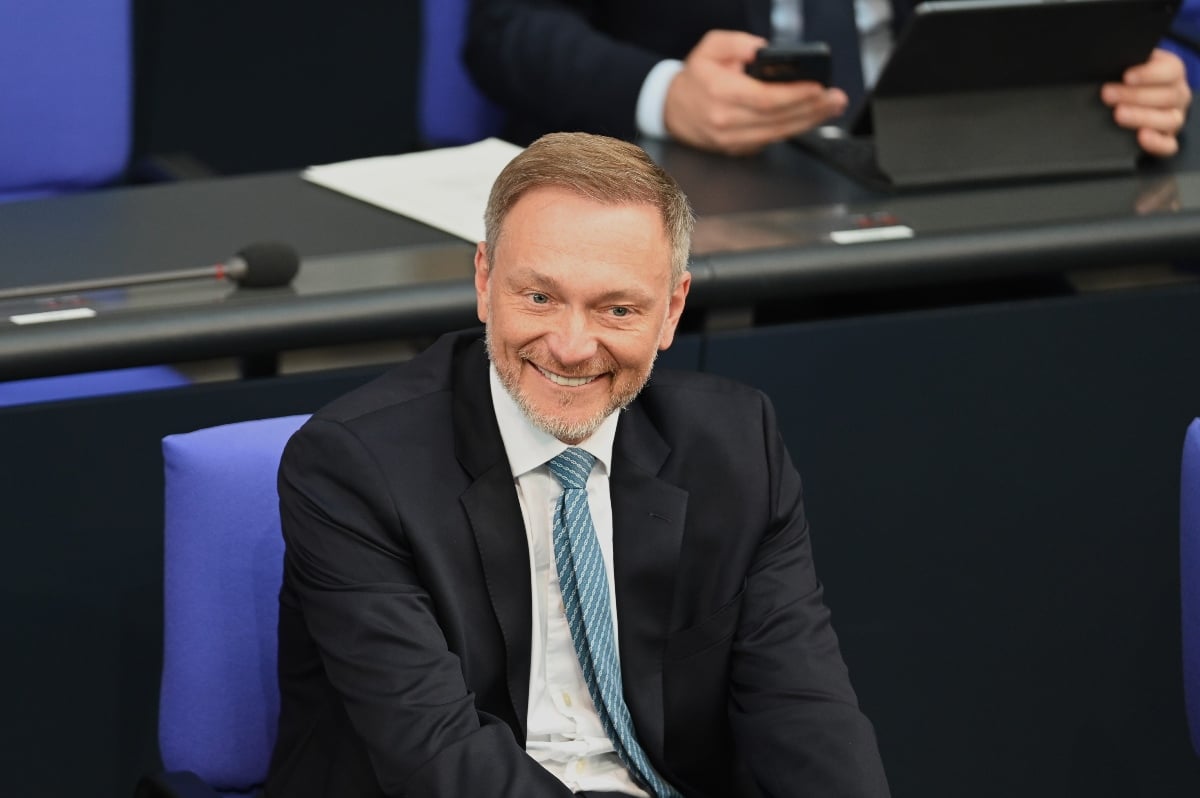Six months to the day since she left office, a sold out Berliner Ensemble audience gathered to see Angela Merkel’s first post-retirement media interview. Coming out with her trademark humour and a blue suit jacket, the former Chancellor answered questions from journalist Alexander Osang for an hour and a half on Tuesday evening.
But it was also an interview that left open more questions than it answered.
Sitting at ease and cracking jokes, Merkel calmly answered Osang’s softball questions, demonstrating that even after six months largely relaxing on the German shores of the Baltic Sea, she still knows how to eat many reporters for breakfast.
Whenever the camera panned to the crowd, it showed a beaming, transfixed audience. “Altkanzlerin” or “ex-Chancellor” or not – Merkel still knows how to hold a room. And when she’s in the room, she still knows how to run the show.
Merkel isn’t doing regrets over Russia and Ukraine
Merkel’s performance during the interview was all the more notable given how her controversial record on Ukraine and Russia dominated the discussion almost entirely.
Somewhat nervously, Osang’s first substantive question – after spending several minutes talking about Merkel’s quiet retirement – was about her decision to block NATO membership for Ukraine and Georgia in 2008. Ukraine at the time, was a divided country plagued by oligarchy and corruption, she said, and not prepared to be in NATO. She reasoned that because membership doesn’t happen overnight, Russia’s Vladimir Putin may well have invaded to prevent Ukraine from joining – at a time when it wasn’t ready to defend itself.
Merkel went on to say that she doesn’t regret how she handled Putin, and defended her record of keeping diplomatic dialogue open with him to try and prevent war.
“I don’t blame myself,” she told the crowd. “I would feel very bad if I had said there wasn’t any point in talking to him.”
READ ALSO: Merkel says she has ‘nothing to apologise for’ over Russia legacy
Merkel didn’t really believe in ‘change through trade’
Merkel insisted she was never under any illusions about who Putin was, and didn’t really believe in Wandel durch Handel (change through trade), or the idea that boosting economic links between Germany and Russia would change how Putin would behave. It was an uncharacteristically frank statement from a politician with a reputation for her public poker face, saying little while in office.
Yet many analysts, both inside and outside Germany, say those are claims that simply don’t stack up against evidence.
“Not believing in ‘change through trade,’ which supposedly guided German policy during much of her time, is a remarkable admission that Germany was basically just profiting from its relationship with Russia, at the expense of Ukraine and central European states like Estonia – without actually trying to use German leverage to make Russia more democratic and less threatening,” said Benjamin Tallis, a Fellow at the Hertie School’s Centre for International Security in Berlin.
“That’s just a policy of naked greed.”
Former Estonian President Toomas Hendrik Ilves commented on Merkel’s interview in similar terms.
“I was not naïve”. Which means she was cynical and devious.
She never explained this reasoning to her fellow EU leaders, at least those of us in CEE.
Instead as late as 2021 wanted a summit with Putin we found out about through a leak to @FT https://t.co/S7AeOH8qRR
— toomas hendrik ilves (@IlvesToomas) June 8, 2022
Merkel’s answers on the state of the German army, or Bundeswehr, weren’t entirely convincing either.
“On a personal level, I thought she was good – funny, engaged, eloquent,” said Dr. Ulrike Franke, a German defence expert with the European Council on Foreign Relations.
Yet Franke says Merkel oversold her role when pushing for higher defence spending against resistance from the Social Democrats, her coalition partner. “She is right that the SPD was putting the brakes on this, and the CDU was pushing more. But her personally? Not so much.”
All the things Merkel didn’t say – from new progressive politics to energy
Merkel’s interview was perhaps just as notable for what she didn’t say – and what Osang didn’t ask her.
If Merkel really didn’t believe in change through trade, how did Germany become so dependent on Russian energy? Osang didn’t ask. Nor did he ask about one of Merkel’s other major decisions – her surprise reversal on continuing nuclear power in Germany after the Fukushima disaster in 2011. That decision made Germany even more dependent on Russian gas, oil, and coal.
“At the time, too little was done to diversify energy sources in Europe and Germany in order to become independent of Russia more quickly,” German Council on Foreign Relations Director Daniela Schwarzer told Tagesschau. Bild newspaper criticised her for being a Chancellor without a plan, particularly on energy.
Nor did we hear about whether Germany should have been more ambitious in its climate targets, or whether the country’s dependence on Russian energy hampers a transition to clean energy.
Merkel’s crisis leadership during Covid-19, the euro crisis – even the 2015 refugee crisis – was scarcely mentioned at all, let alone subjected to serious questioning.
We did find out that she broadly supports the current government but doesn’t wish to comment on everything from the sidelines, akin to a grandmother trying not to tell her granddaughter how to bring up her children. From a woman who has been referred to as Germany’s “Mutti” or “Mummy,” it was an apt analogy.
But beyond its Ukraine policy, which specific bits of the new government’s agenda does the ex-Chancellor agree or disagree with? Merkel didn’t say and Osang didn’t ask.
And it would be interesting to know because a lot of change is happening. For instance, the country’s strict abortion laws are being eased. Cannabis is set to be legalised. Dual citizenship is to be allowed, even if the current government hasn’t yet said precisely when.
All of these decisions point to a very different Germany than the one under Merkel – but they weren’t discussed.
We did, however, hear quite a bit about how Merkel is spending her retirement. She is enjoying hiking in nature and reading the books she hasn’t had time to get to – including Shakespeare’s Macbeth.
Beyond that, we mostly heard about Merkel’s foreign policy, which may end up largely defining her legacy. For better or worse, that risks leaving so many of her other decisions broadly unexamined.
READ ALSO: An era ends: How will Germany and the world remember the Merkel years?




 Please whitelist us to continue reading.
Please whitelist us to continue reading.
Member comments